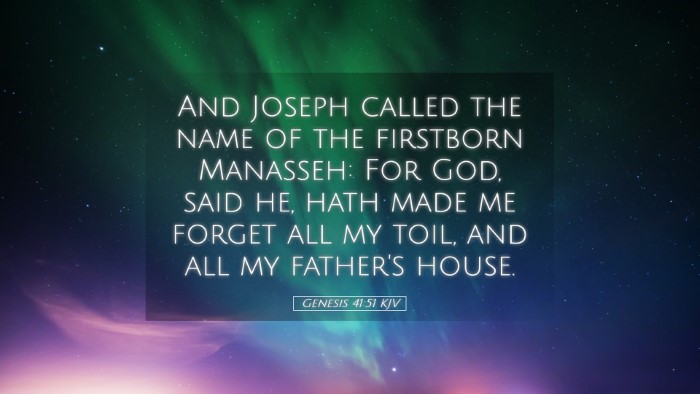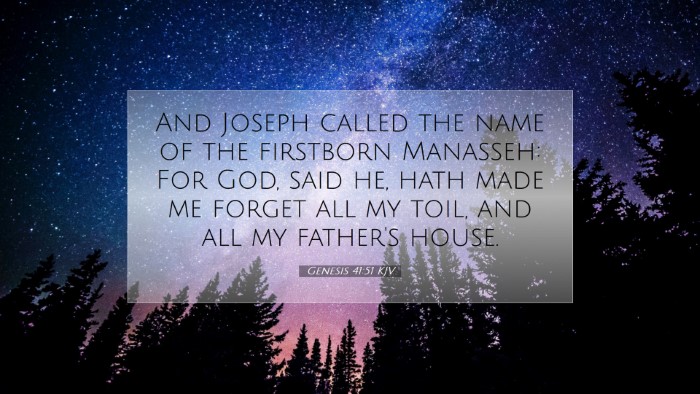Commentary on Genesis 41:51
Genesis 41:51 captures a significant moment in the life of Joseph, reflecting his journey and the profound themes of God's providence and redemption. The verse states:
"And Joseph called the name of the firstborn Manasseh: For God said he hath made me forget all my toil, and all my father's house." (Genesis 41:51, KJV)
1. Contextual Background
This verse occurs in the context of Joseph's rise to power in Egypt following his interpretation of Pharaoh's dreams. Joseph's story showcases God's sovereignty and the transformative power of suffering and redemption. As he names his sons Manasseh and Ephraim, Joseph illustrates a profound theological reflection on the nature of God's actions in his life.
2. The Significance of Names
The act of naming in biblical times holds significant meaning, often reflecting circumstances or divine intervention. Joseph names his firstborn Manasseh, which means "making to forget" in Hebrew. This act symbolizes a transformative moment in Joseph's life; it signifies not just personal forgetfulness of suffering, but also a broader theological truth about God's provision and healing in the midst of trials.
- Matthew Henry Commentary: Henry emphasizes that naming his son Manasseh conveys Joseph's gratitude toward God for alleviating the pain associated with his past. It reflects a change in Joseph's heart as he acknowledges God's work in his life.
- Albert Barnes Notes: Barnes further elaborates that Joseph's name choice conveys a sense of closure to his past struggles and a new beginning in his life. Joseph’s narrative encapsulates how faith can transform our perspective on suffering.
- Adam Clarke's Commentary: Clarke points out that Joseph’s acknowledgment of God’s hand in helping him forget his toil underscores a central theme in scripture: the idea that God can bring about healing and restoration in our lives.
3. Themes of Suffering and Restoration
Joseph's journey is emblematic of the theodicy topic in the Bible—how God allows suffering while still being a God of goodness and restoration. By naming his son Manasseh, Joseph not only embraces his new identity but also surrenders his pain to God.
- Theological Implications: The act of forgetting is not about losing memories but rather about overcoming the emotional bondage of past pain. Joseph distinctly recognizes God's role in this process.
- Practical Applications: For modern readers, this verse serves as a reminder that, despite past struggles, God provides avenues for healing. It affirms the belief that through faith, believers can experience a new beginning.
4. The Role of Divine Providence
Joseph's life encapsulates divine providence operating within the complexities of human experiences. His assertions about forgetting highlight a trust in God’s plan, even through times of great adversity.
- Providential Care: Joseph’s ability to forget indicates a profound trust that God's plans are working for his good (Romans 8:28). His life is a testimony to the truth that God can orchestrate events for His purposes.
- Faith and Resilience: Joseph’s resilience, despite his past, serves as an encouragement to those encountering trials. His story illustrates that God actively works in the lives of His people, bringing about transformation and victory over adversity.
5. A Message for Today's Believers
Genesis 41:51 serves as an inspirational testament to all believers, speaking to pastors, theologians, and scholars alike. It emphasizes resilience, divine intervention, and the healing power of God in the life of a believer.
- For Pastors: This verse can be used to encourage congregations that healing and restoration are possible through faith in God.
- For Theologians: The exploration of God's providence in Joseph's life invites deeper discussions regarding the intersection of divine sovereignty and human free will.
- For Students: Analyzing Joseph's response to his experiences can enhance one’s understanding of biblical narratives and the lessons they impart about faith and trust in God.
Conclusion
The rich tapestry of Joseph’s narrative in Genesis reminds us that God is intimately involved in the lives of His people, transforming pain into purpose. Joseph’s declaration of naming his son Manasseh serves as a poignant reminder of the blessings of forgetfulness in the face of suffering—an invitation to trust God’s hand at work in the journey of life, no matter how tumultuous it may seem.


